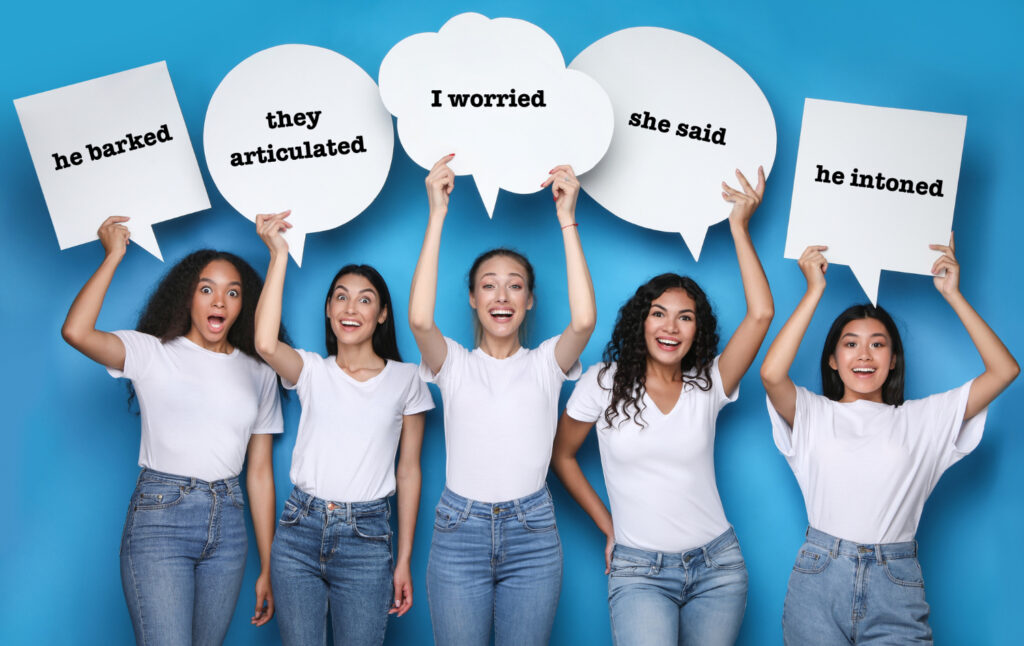Have you ever been yanked out of a great story after repeatedly encountering clunky dialogue tags like he intoned, she questioned, or they retorted? Or worse, tags that don’t even describe the act of speaking such as I grinned, he frowned, or she gasped?
It’s a peculiar trend that seems to have gained traction in contemporary fiction lately.
Many writers have abandoned the use of said almost completely in their narratives. I suspect it’s because they’ve heard that said is overused in dialogue, and to choose it is lazy. However, they might be taking this advice too literally. When writers habitually replace said with synonyms or other verbs that have little to do with speaking, the prose feels amateurish and creates an extra hurdle for readers to jump over.
Why has said become such a black sheep in the literary world?
If these writers are so against using this four-letter word in their dialogue, wouldn’t it serve them better to craft prose that naturally indicates the speaker without any attribution at all?
Fun fact: I once hurled a book at a wall after coming across (in my opinion) the cringiest dialogue tag in existence: she purred. Purring is for felines, not grown women in the throes of passion!
Don’t get me wrong. I’ve seen plenty of big-name authors using fancy dialogue markers in their writing as well. One of them is Jodi Picoult, who slapped he instructs into her latest novel, Wish You Were Here. The difference, however, is that Picoult is a pro, and she knows it’s better to sprinkle in her more ornate tags like fairy dust—not dump them in by the bucketful.
To illustrate my point, below is an excerpt from my latest time-travel thriller, Dragonfly, which I’ve intentionally doctored to show several of these offending tags in action.
“I’m happy to do it,” Jarett orated. “Honestly, whatever you need.”
“Well, in that case, I do need your help with something,” I smirked, heading down the stairs in my flip-flops and housecoat.
He followed me to a five-foot-wide crater in the middle of my lawn, about halfway between the house and the shoreline.
“What the hell?” he shuddered.
“I’ve been busy,” I put forth.
While this example might appear exaggerated, I assure you it reflects actual dialogue I’ve observed in novels over the past few years. Out of professional courtesy, I won’t cite specific authors, but there’s no shortage of similar examples on today’s bestseller lists for you to discover.
Let’s break these down to see why a writer might have chosen them.
Jarett orated. Go ahead and look up say in a thesaurus. You’ll find a range of synonyms, from common alternatives to more elaborate options like orate. Some writers, in their eagerness to avoid repeating said, might be tempted to use these fancier verbs as dialogue tags, even when they don’t quite fit the context.
I smirked and He shuddered. A person cannot smirk or shudder their speech. They can state, declare, claim, answer, or reply, but I have yet to run into anyone who can smirk or shudder out a sentence. Try it for yourself.
I put forth. Just another distracting way of saying I said.
Now, here’s the streamlined version of the passage that made it into the final draft of my novel:
“I’m happy to do it. Honestly, Syd, whatever you need.”
“Well, in that case, I do need your help with something.” I jumped up and started down the stairs in my flip-flops and housecoat. “Come on.”
He followed me to a five-foot-wide crater in the middle of my lawn, about halfway between the house and the shoreline.
“What the hell?” His eyes were as wide as the hole.
“I’ve been busy.”
This revised passage demonstrates a more nuanced approach to dialogue attribution. By eliminating explicit tags, the text relies on context, character actions, and the dialogue itself to identify speakers. This technique, while requiring more careful crafting, results in a smoother, more immersive reading experience that keeps the focus firmly on the story and characters.
That being said 😉, perhaps you’ve noticed the liberal use of said in my novels. Or maybe you haven’t. If you’re like most readers, you find its presence similar to a painting that’s been hanging on your wall for years—blending humbly into the background until you take the time to observe it.
At this point, you might be wondering, “Who is this MJ Mumford to dictate what’s right or wrong—an unknown, independently published time-travel thriller writer?”
Fair point. I’m not a household name, and my books have only appeared fleetingly on the bestseller lists. I’m merely sharing my perspective about a trend that’s been testing my nerves for some time. If you’re a writer who favors elaborate dialogue tags, that’s your prerogative. Just be mindful that overusing them could cost you an engaged audience, myself included.
If you’re an avid reader, lay it on me! Am I just extra sensitive about this because I’m a writer as well as a reader? Or does this issue resonate with you too?
